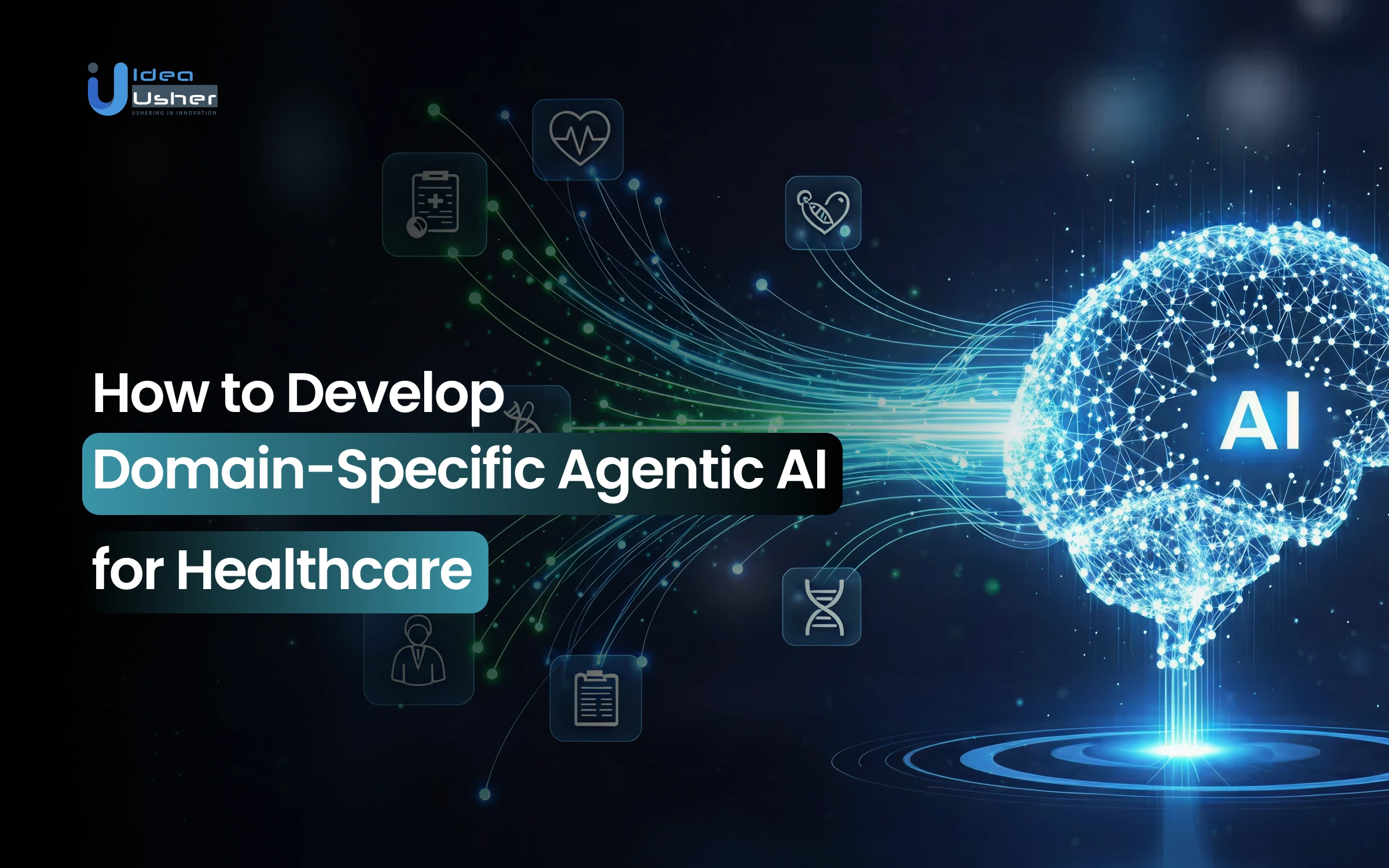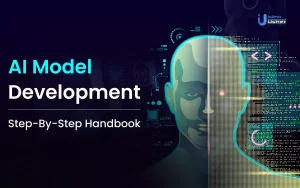Healthcare is a complex and high-stakes field, where every decision from diagnosis to treatment can have serious consequences. Medical professionals often deal with overwhelming data, heavy administrative work, and not enough time for patient care. AI healthcare agents are now helping by taking on specific tasks, supporting doctors, and changing how healthcare systems work.
Unlike general AI tools, domain-specific agentic AI models are designed for medical workflows. They can analyze patient histories, help with diagnosis, automate paperwork, and improve care coordination. These AI agents use clinical data and adaptive reasoning to make decisions that are both data-driven and relevant to the situation.
In this blog, we’ll explore how to develop domain-specific agentic AI for healthcare, breaking down its architecture, technology stack, and implementation roadmap. You’ll gain clarity on how agentic AI can drive efficiency, safety, and smarter care delivery in the medical field.
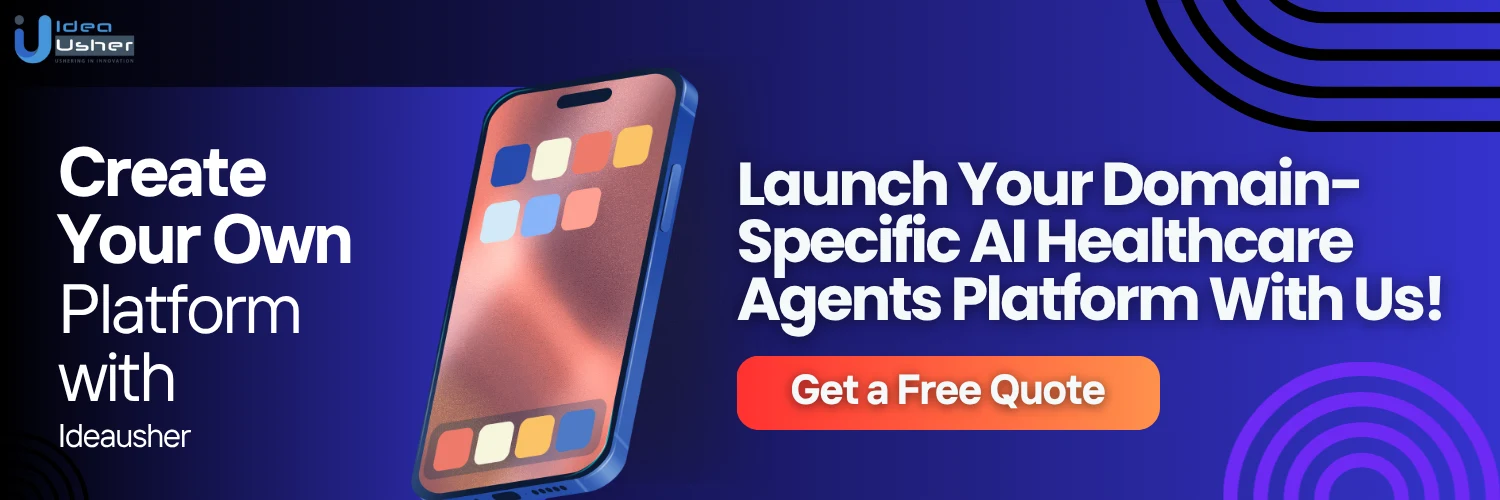
What is Domain-Specific Healthcare Agentic AI?
Domain-Specific Agentic AI in healthcare refers to intelligent, autonomous systems designed to operate within the workflows, data environments, and regulatory frameworks of specific medical domains. Unlike general-purpose AI, these agents can perceive, reason, and act in a defined clinical or operational context, for example, cardiology, radiology, or patient flow management.
They don’t just provide insights; they execute tasks, orchestrate multi-step workflows, and collaborate with clinicians or other healthcare systems, continuously adapting to improve outcomes and operational efficiency.
What sets domain-specific agentic AI apart in healthcare is its ability to drive real impact across the organization:
- Enables autonomous decision-making in complex, domain-specific scenarios.
- Transforms hospitals or clinics into adaptive, intelligent ecosystems rather than fragmented workflows.
- Reduces operational bottlenecks, administrative workload, and manual intervention.
- Enhances patient experience and care quality by ensuring faster, more accurate decisions.
- Provides a scalable and specialized AI foundation for deploying further clinical or operational innovations.
How Healthcare Agentic AI Transforms Hospital Workflows and Patient Care?
Domain-specific agentic AI in healthcare works by autonomously managing clinical, operational, and administrative processes while collaborating with human clinicians. Its workflow can be understood in five core stages:
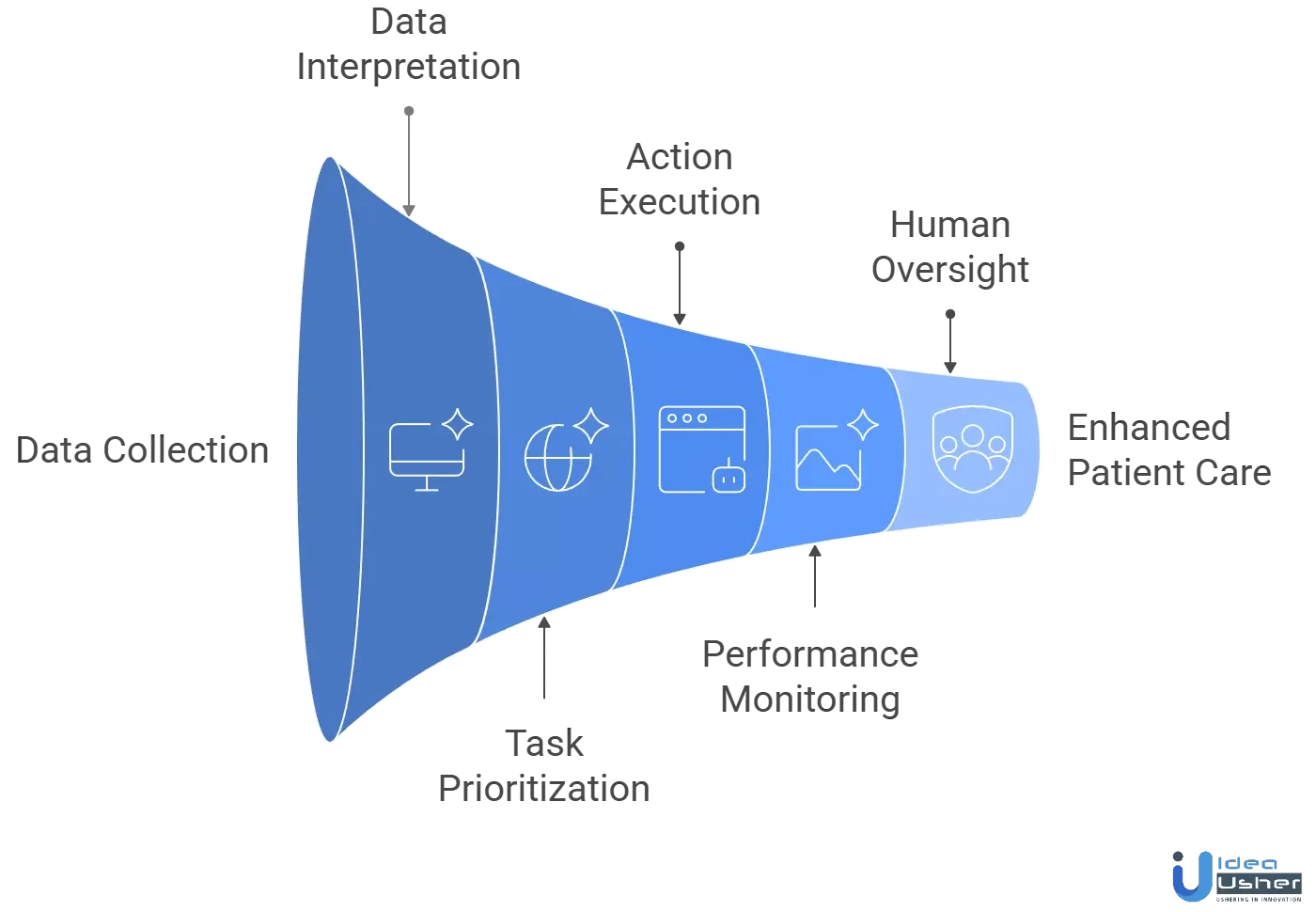
1. Perception & Data Intake
The AI agent continuously collects and interprets data from multiple sources such as electronic health records (EHRs), lab results, imaging systems, and patient monitoring devices. It identifies critical information like abnormal lab values, high-risk patients, or workflow bottlenecks in real time.
2. Reasoning & Prioritization
After gathering data, the agent analyzes it within the context of domain-specific protocols. It prioritizes tasks based on urgency, for example, flagging critical lab results or high-risk patient cases, ensuring resources are allocated effectively.
3. Action & Automation
The AI agent executes recommended actions autonomously, such as updating schedules, sending alerts to clinicians, or initiating care pathways. This reduces manual intervention, accelerates processes, and ensures timely response to patient needs.
4. Monitoring & Feedback
The system tracks outcomes and performance metrics to continuously refine its decision-making. By learning from previous cases, the agent improves accuracy, anticipates recurring issues, and enhances workflow efficiency over time.
5. Human Oversight & Compliance
While the agent automates routine and urgent processes, clinicians remain in control of critical decisions. The system ensures all actions comply with healthcare regulations and ethical standards, providing transparency and auditability.
Benefits of Domain-Specific AI Healthcare Agents
Domain-specific agentic AI is transforming healthcare by improving efficiency, patient outcomes, and operational performance across hospitals and clinics.
A. Benefits for Users & Hospitals
These AI solutions empower clinicians, optimize hospital workflows, and enhance the overall healthcare infrastructure for better patient care.
- Enhanced Patient Care: AI agents provide timely insights, assist in triage, and support follow-ups, improving clinical accuracy and patient outcomes.
- Operational Efficiency: Automates repetitive tasks such as scheduling, documentation, and resource allocation, significantly reducing administrative workload.
- Optimized Healthcare Infrastructure: Integrates data from EHRs, lab results, and medical devices to streamline workflows and improve coordination across departments.
- Scalable and Adaptive Systems: Learns from real-world outcomes, adjusts protocols, and enhances hospital flexibility and responsiveness.
- Regulatory Compliance and Safety: Ensures all actions follow HIPAA, GDPR, and ethical standards, safeguarding patient data and maintaining trust.
B. Benefits for Businesses
For businesses and investors, domain-specific agentic AI offers measurable ROI, market differentiation, and scalable growth opportunities in the healthcare sector.
- Faster ROI: Hospitals adopting agentic AI experience cost reductions and efficiency gains, translating into measurable financial benefits.
- Market Differentiation: Businesses offering domain-specific AI gain a competitive edge in the growing healthcare AI sector.
- Scalable Solutions: Platforms can expand across multiple hospitals or regions, driving broader adoption and revenue potential.
- Data-Driven Insights: Aggregated analytics allow businesses to evaluate performance, optimize solutions, and make informed strategic decisions.
- Future-Ready Innovation: Investing in agentic AI positions companies at the forefront of autonomous healthcare technologies, preparing them for long-term growth.

How Hospitals Using Agentic AI Across Workflows Achieved 30% Lower Admin Load?
The global agentic AI in healthcare market was valued at USD 538.51 million in 2024 and is expected to reach USD 4.96 billion by 2030, growing at a CAGR of 45.56% from 2025 to 2030. This growth reflects the shift from basic AI automation to autonomous decision-making systems in healthcare.

Hospitals using agentic AI for scheduling and care coordination have seen a 30% reduction in administrative workload and 40% faster admissions and discharges. These systems autonomously handle patient triage, documentation, and logistics, creating intelligent hospital ecosystems that enhance care and reduce staff burnout.
The Domain-Specific Impact Where Precision Meets Autonomy
Once this foundational infrastructure is in place, domain-specific agentic AI takes healthcare performance to the next level.
For example:
- Viz.ai improved stroke care coordination, resulting in 14% more patients receiving life-saving interventions.
- Aidoc helped hospitals achieve a 41% faster turnaround for critical imaging results.
- Qventus enabled hospitals to reduce patient length of stay by 14% through AI-driven flow management.
- Caption Health reduced ultrasound scan times by 43%, empowering even non-expert clinicians to capture high-quality imaging.
These successes are not one-off events. They happen because of smart, specialized agents built on scalable, cloud-based systems.
The Business Case for Scalable Healthcare Agentic AI
The business momentum behind agentic AI in healthcare is undeniable.
- 74% of health system leaders say AI agents already deliver measurable returns.
- 85% of hospitals plan to expand AI investment over the next two years.
- 27% of organizations already deploy agentic automation, with another 39% planning adoption soon.
- 22% of healthcare organizations have adopted domain-specific AI tools, a 7x increase from last year, indicating rapid growth in this technology.
This shows that the market is not just ready. It is actively looking for next-generation agentic platforms that can securely integrate data, ensure compliance, and deliver measurable results.
Building domain-specific, cloud-native agentic AI infrastructure today means positioning your platform at the heart of tomorrow’s intelligent healthcare systems.
Key Features of Agentic AI for Healthcare
AI healthcare agents introduce advanced intelligence that extends beyond automation to deliver adaptive, context-aware, and ethically guided support across medical environments. The following key features define how this technology enhances efficiency, safety, and decision-making in healthcare operations.

1. Context-Aware Decision-Making
Agentic AI systems are designed to understand medical information within its proper clinical context. Instead of producing generalized responses, they analyze patient history, current symptoms, and diagnostic data to provide contextually relevant insights. This enables more precise and personalized medical recommendations.
2. Autonomy with Human Oversight
Agentic AI operates with a high degree of autonomy while maintaining transparent collaboration with human experts. The system can independently analyze data, detect anomalies, and suggest next steps, but ultimate decisions remain under human supervision. This balance ensures efficiency without compromising patient safety or professional accountability.
3. Continuous Knowledge Adaptation
These systems are built with self-learning capabilities that enable continuous improvement through exposure to new data, medical research, and user interactions. By adapting to evolving healthcare knowledge, the AI remains accurate, relevant, and aligned with the latest treatment guidelines and medical standards.
4. Explainability & Transparency
Trust is essential in healthcare applications, which is why Agentic AI emphasizes explainable and transparent decision-making. The system provides clear reasoning behind its conclusions, allowing healthcare professionals to understand and validate AI-generated insights. This enhances both trust and compliance with regulatory requirements.
5. Data Privacy & Compliance
Handling sensitive medical information demands strict data protection. Agentic AI systems adhere to privacy regulations and ethical standards to safeguard patient data. They employ anonymization, consent management, and secure data handling practices to ensure responsible use of healthcare information.
6. Interoperable Healthcare Systems
A critical feature of Agentic AI is its seamless integration with existing healthcare infrastructures, such as electronic health records, telemedicine platforms, and hospital management systems. This interoperability enables real-time data exchange and ensures that AI insights fit naturally within clinical workflows.
7. Multi-Agent Collaboration
Agentic AI often functions as a network of specialized agents, each focusing on distinct healthcare domains such as diagnostics, patient engagement, or administrative management. These agents collaborate to share information and coordinate actions, resulting in more comprehensive and efficient healthcare support.
8. Responsible Decision-Making
Ethical responsibility is a cornerstone of Agentic AI in healthcare. The technology is designed to minimize bias, maintain fairness, and uphold patient rights while making decisions. By integrating ethical frameworks into its core logic, Agentic AI ensures that automation aligns with medical integrity and societal values.
9. Real-Time Monitoring & Intervention
A critical feature of advanced Agentic AI is its ability to monitor patient data in real time through connected devices, sensors, or electronic records. When anomalies or risks are detected, the AI can alert healthcare providers or trigger preventive measures.

Development Process of Domain-Specific Agentic AI for Healthcare
Developing domain-specific AI healthcare agents is a structured journey that combines technical expertise, medical knowledge, and ethical responsibility. We ensure that every stage contributes to building an AI system that enhances clinical decision-making, supports patient care, and aligns with healthcare standards.
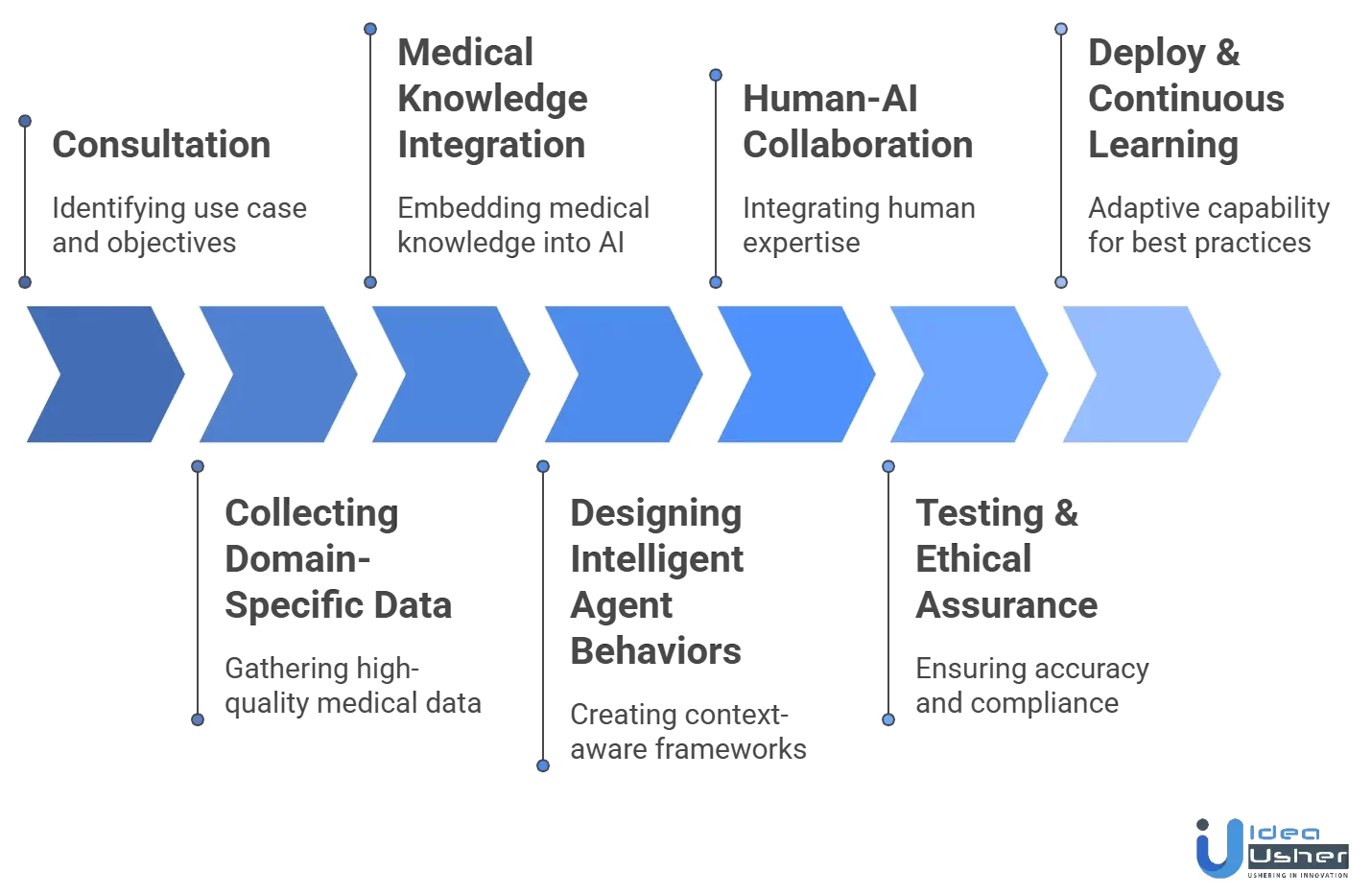
1. Consultation
We start by identifying the healthcare use case and setting clear objectives through consulting and guiding you with a detailed roadmap. This helps us understand clinical challenges and how AI can drive measurable improvements, whether in diagnosis, patient engagement, or workflow optimization, ensuring alignment with real-world healthcare goals and regulations.
2. Collecting Domain-Specific Data
We gather high-quality medical data from both structured and unstructured sources, such as clinical notes, imaging files, and electronic health records. Throughout, we prioritize patient privacy and data security, using anonymization techniques and adhering to all regulations. The data is carefully standardized and cleaned, creating a robust foundation for model development.
3. Medical Knowledge Integration
To develop an intelligent healthcare agent, we embed deep medical knowledge into the AI system, integrating medical ontologies, treatment guidelines, and relationships between clinical terms. Our aim is to ensure the AI interprets information with medical reasoning consistent with healthcare standards.
4. Designing Intelligent Agent Behaviors
We define the AI agent’s behavior and decision-making by creating goal-oriented, context-aware frameworks. This approach allows the AI to analyze data, reason through possible outcomes, and adapt its actions such as identifying abnormalities, suggesting next steps, or prioritizing patient cases, while ensuring medical experts retain control over final decisions.
5. Human-AI Collaboration
We believe effective healthcare AI should complement human expertise. By integrating human-in-the-loop systems, medical professionals can review and refine AI outputs. Continuous feedback from healthcare staff enhances the system’s accuracy and reliability, ensuring trust and accountability in AI-driven actions.
6. Testing & Ethical Assurance
Before deployment, we conduct thorough validation and testing of the AI system using real clinical data to ensure accuracy and consistency. We assess bias, transparency, and ethical compliance, ensuring all AI decisions are explainable and traceable for medical practitioners. Our framework ensures the system meets ethical and regulatory standards throughout its use.
7. Deploy & Continuous Learning
Our final step emphasizes continuous learning and system evolution. As healthcare knowledge rapidly changes, our AI is designed to learn from new research, updated treatment guidelines, and user feedback. This adaptive capability ensures the AI stays current and aligned with the latest clinical best practices.
Cost to Develop Domain-Specific AI Healthcare Agents
The cost of developing a domain-specific AI healthcare agents varies depending on project complexity, data requirements, and desired functionality. Below is a clear cost breakdown across the key development phases, reflecting the overall estimated investment.
| Development Phase | Description | Estimated Cost |
| Consultation | Covers project scoping, requirement analysis, and defining healthcare use cases aligned with compliance standards. | $5,000 – $10,000 |
| Healthcare Data Collection | Involves collecting, cleaning, and preparing medical data while ensuring privacy and regulatory compliance. | $14,000 – $26,000 |
| Knowledge Integration | Embeds medical knowledge, treatment guidelines, and domain logic into the AI for contextual reasoning. | $11,000 – $18,000 |
| Intelligent Agent Behaviors | Focuses on building goal-driven, adaptive AI behaviors for autonomous and context-aware decision-making. | $20,000 – $34,000 |
| Human-AI Collaboration | Develops feedback systems and interfaces that allow clinicians to supervise and refine AI actions. | $10,000 – $15,000 |
| Testing | Ensures performance accuracy, bias reduction, transparency, and compliance with healthcare ethics. | $12,000 – $24,000 |
| Deployment & Updatation | Maintains and updates the AI post-deployment through ongoing learning and system optimization. | $10,000 – $12,000 |
Total Estimated Cost: $68,000 – $135,000
Note: Development costs can vary based on project scope, data availability, compliance requirements, and AI sophistication. Customization, integration with healthcare systems, and ongoing optimization may also affect the final budget.
Consult with IdeaUsher to get a personalized cost estimate and a detailed roadmap for developing a high-performing, domain-specific Agentic AI tailored to your healthcare goals.
Tech Stack Recommendation for Healthcare Agentic AI Development
Choosing the right tech stack is essential for developing AI healthcare agents that are secure, scalable, compliant, and capable of autonomous reasoning across sensitive clinical environments.
1. Core Programming Languages
Python and R form the foundation for building AI algorithms, data processing pipelines, and analytical models. They enable flexible development, strong library support, and efficient medical data computation.
2. AI and Machine Learning Frameworks
TensorFlow, PyTorch, and LangChain power the creation of intelligent agentic systems by supporting deep learning, reasoning workflows, and autonomous behavior modeling for clinical applications.
3. Healthcare Data Interoperability
FHIR (Fast Healthcare Interoperability Resources) and HL7 standards ensure smooth and compliant data exchange between AI agents, EHRs, and healthcare systems, maintaining interoperability and regulatory alignment.
4. Cloud Infrastructure and Deployment
AWS, Google Cloud, and Microsoft Azure provide scalable, HIPAA-compliant cloud environments with GPU capabilities for training, deploying, and managing healthcare AI applications.
5. Containerization and Orchestration
Docker and Kubernetes streamline deployment and scaling by packaging AI models into containers and managing distributed workloads efficiently across healthcare infrastructure.

Challenges & Solutions in Building AI Healthcare Agents
Developing domain-specific AI healthcare agents can transform hospital workflows and patient care. However, hospitals face practical challenges that must be solved strategically. Addressing these challenges ensures seamless adoption and measurable impact.
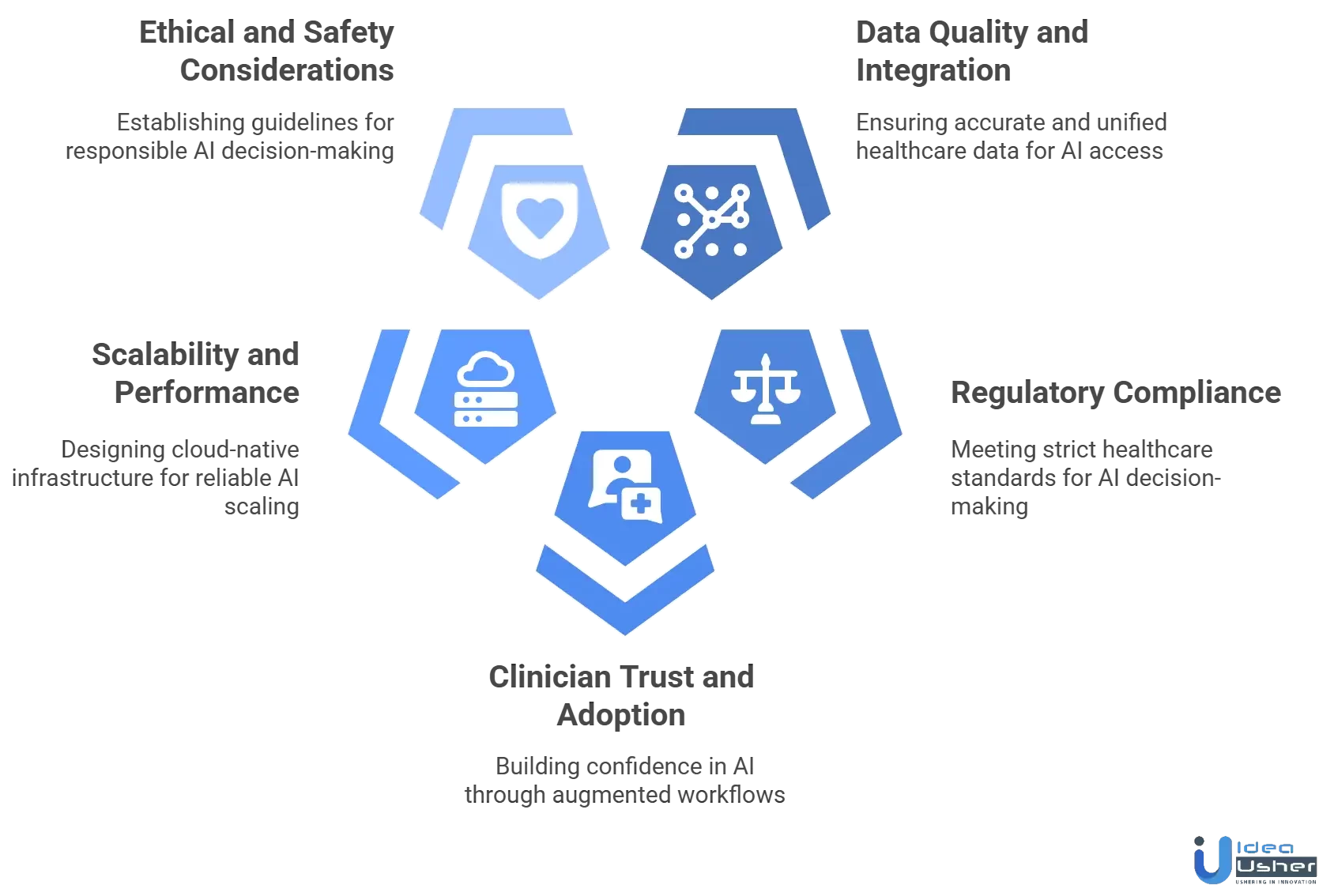
1. Data Quality and Integration
Challenge: Hospitals often store critical patient data in fragmented systems, making it difficult for agentic AI to access accurate and unified healthcare information.
Solution: We create robust data pipelines and secure APIs that integrate EHRs, lab results, imaging, and monitoring systems, enabling the AI to perceive and act accurately across all hospital workflows.
2. Regulatory Compliance
Challenge: Autonomous AI actions in healthcare must meet strict HIPAA and GDPR standards, which adds complexity to decision-making within hospital systems.
Solution: We embed real-time compliance checks, audit logs, and human-in-the-loop approvals in the agentic AI workflows, ensuring all actions are transparent, auditable, and regulation-compliant.
3. Clinician Trust and Adoption
Challenge: Clinicians may hesitate to rely on autonomous AI agents for critical patient or operational decisions without proven reliability.
Solution: We implement AI in augmented workflows, letting clinicians review suggestions while the AI optimizes processes. Gradually, trust builds as performance metrics and efficiency gains become visible.
4. Scalability and Performance
Challenge: Scaling domain-specific AI across multiple departments or facilities requires cloud-native infrastructure capable of handling large data volumes reliably.
Solution: We design modular, cloud-native architectures that can scale efficiently, orchestrate complex workflows, and maintain consistent high performance across multiple hospital environments.
5. Ethical and Safety Considerations
Challenge: Autonomous AI decision-making carries risks for patient safety and ethical responsibility, especially in sensitive clinical scenarios.
Solution: We establish ethical guidelines, risk mitigation protocols, and fail-safe mechanisms within the AI, ensuring patient safety, adherence to clinical standards, and responsible autonomous actions.
Real-World Examples of Domain-Specific AI Healthcare Agents
Healthcare is evolving with agentic AI platforms designed for medical, clinical, and administrative workflows. These agents automate decisions, boost patient engagement, and improve efficiency while staying compliant with standards.
1. Sully.ai
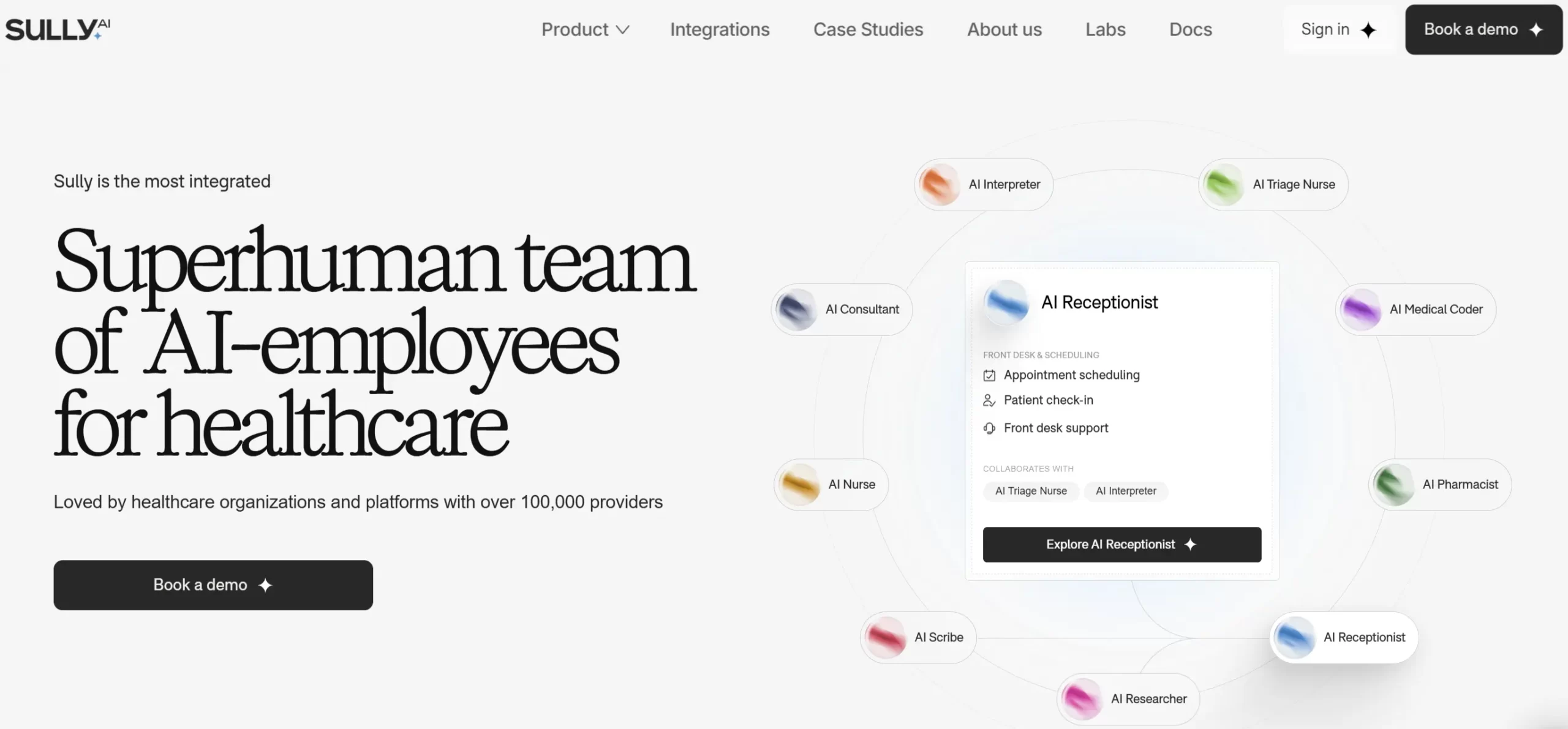
Sully.ai offers intelligent agents like AI Receptionist, Scribe, and Medical Coder for hospitals and clinics. They streamline triage, automate documentation, and manage coding, all while maintaining HIPAA and SOC 2 Type II compliance. Seamless integration with EHR systems helps reduce admin tasks and lets providers focus more on patient care.
2. Grace by Grove AI
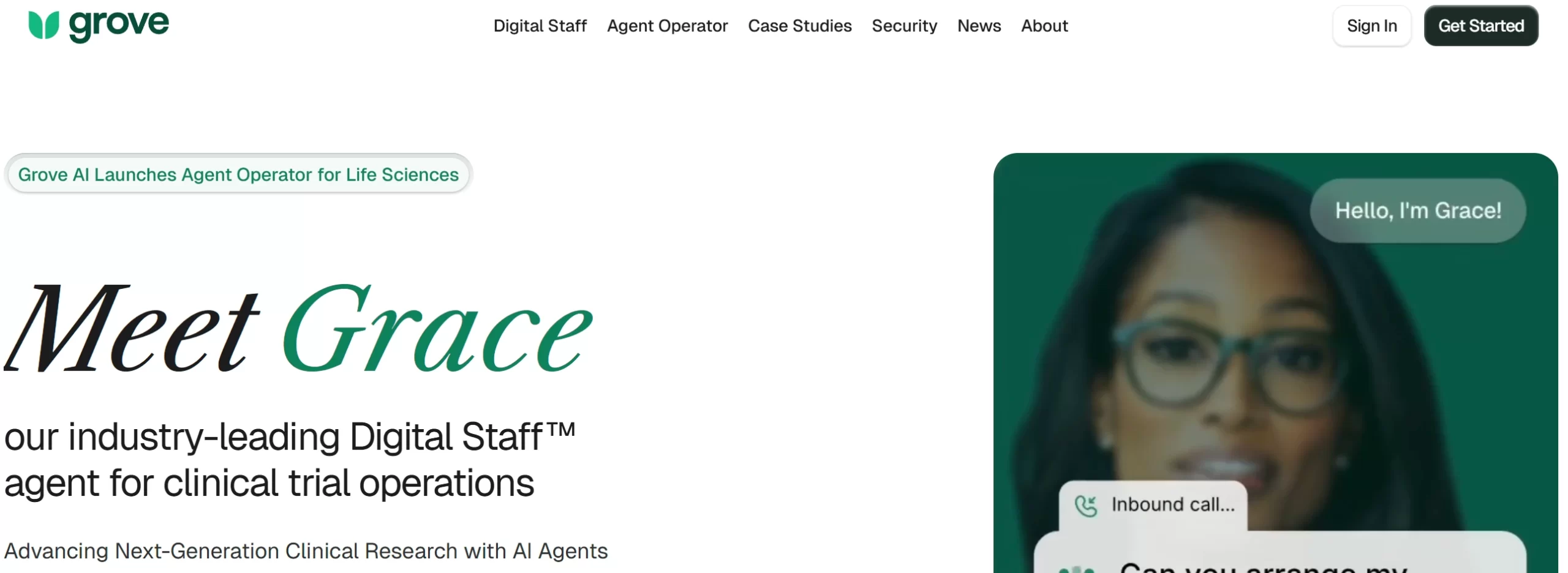
Grace, by Grove AI, is an AI agent for clinical trials and the first to get IRB approval for patient recruitment. It automates outreach, screening, and follow-up, ensuring ethical communication and consistent engagement. It reduces recruitment bottlenecks and speeds up trial timelines.
3. Nabla Copilot
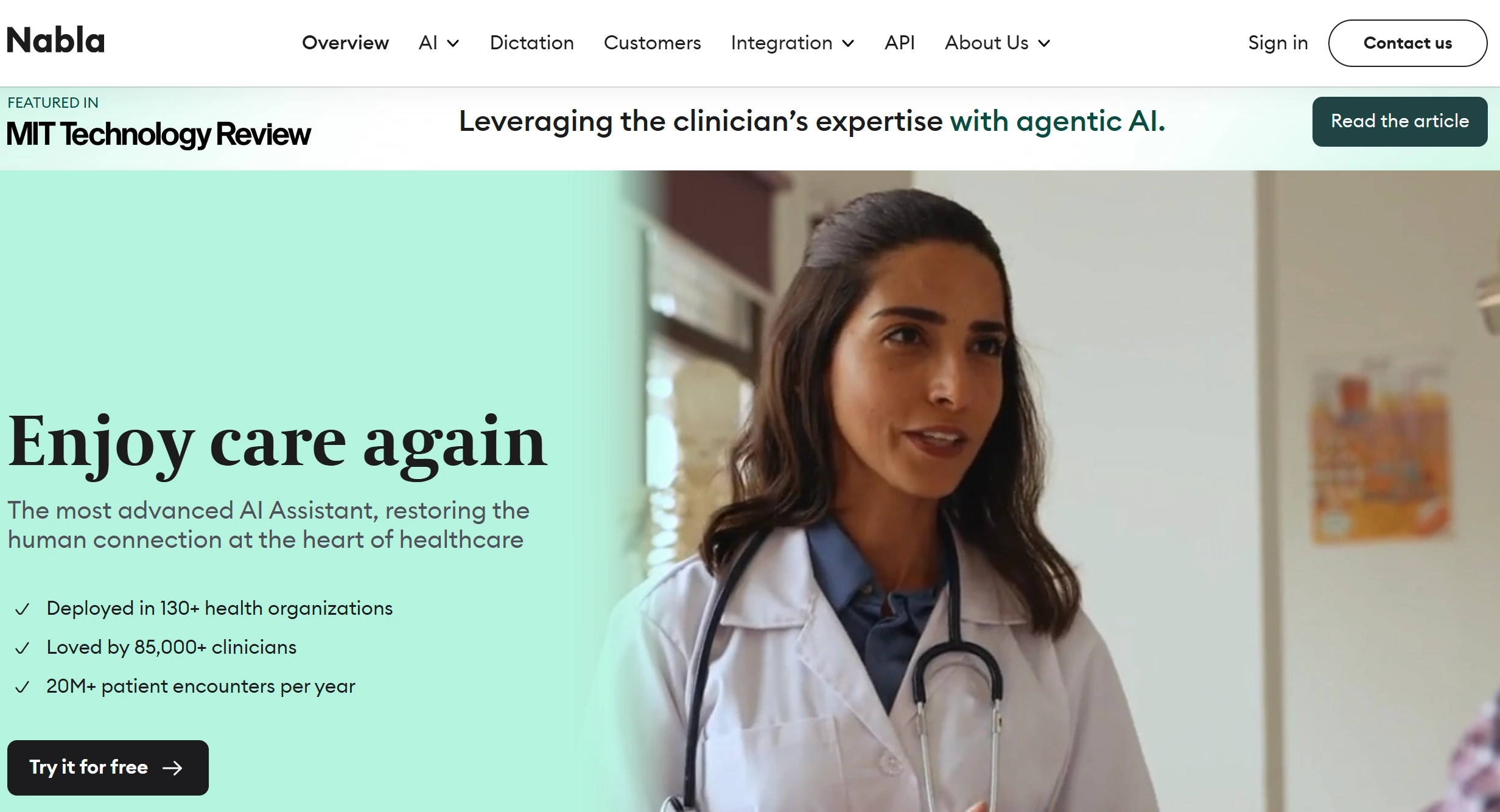
Nabla Copilot is an AI medical assistant that listens to clinician-patient conversations and generates structured clinical documentation. It integrates with EHRs for compliant, accurate notes, helping providers boost productivity, reduce burnout, and spend more time with patients.
4. Suki Assistant
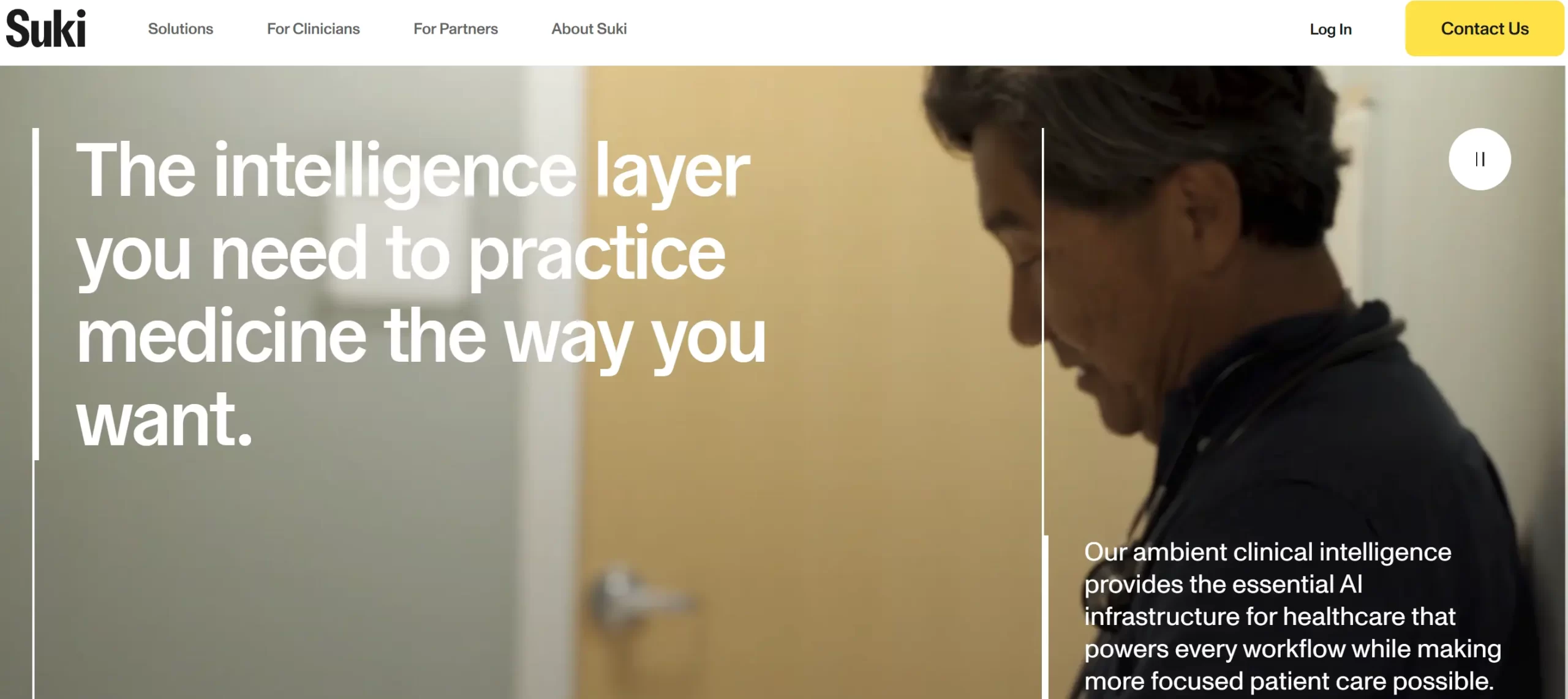
Suki is an AI voice assistant for clinicians that simplifies medical documentation. It listens to conversations, generates clinical notes, and integrates with EHR systems. Automating tasks like charting and coding enhances workflow efficiency and reduces clinician burnout.
5. TriageGO
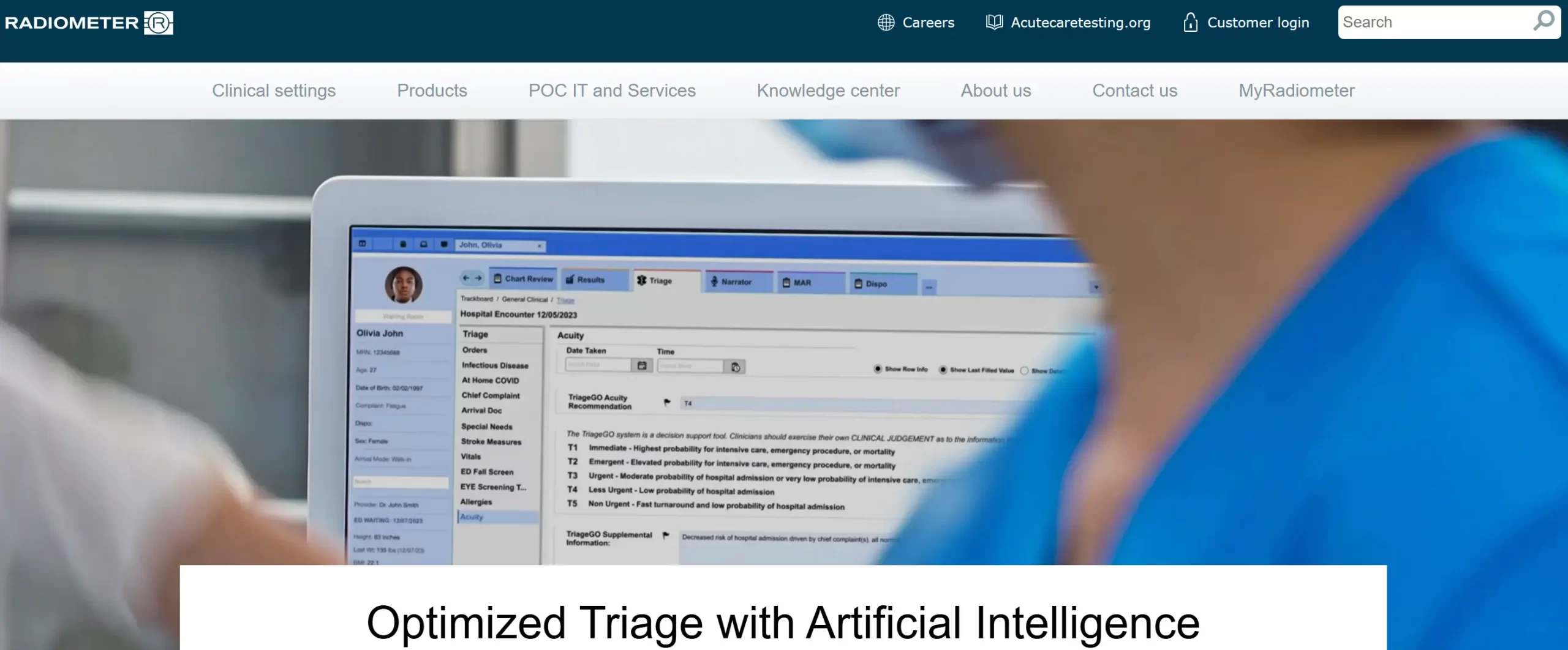
TriageGO is an AI platform for emergency departments that uses machine learning to analyze patient data and support real-time triage. Its adaptive algorithms assist with risk stratification, acuity prediction, and workflow prioritization, enhancing decision-making while keeping clinicians in the loop.
Conclusion
Developing AI healthcare agents allows medical organizations to enhance patient care, streamline workflows, and improve decision-making with intelligent automation. By focusing on domain-specific needs, these agents can process complex medical data, provide accurate insights, and assist healthcare professionals efficiently. Properly implemented AI healthcare agents ensure compliance, data privacy, and reliability while supporting personalized treatment and operational efficiency. This approach enables hospitals, clinics, and research institutions to leverage intelligent systems that not only optimize processes but also contribute to better outcomes for patients and the broader healthcare ecosystem.
Why Choose IdeaUsher for Developing AI Healthcare Agents?
At IdeaUsher, we specialize in creating AI healthcare agents tailored for hospitals, research institutions, and digital health startups. Our team integrates domain expertise with advanced AI to help you build reliable, compliant, and high-performing healthcare solutions.
Why Work with Us?
- Healthcare-Centric Expertise: We understand the complexities of medical workflows, ensuring AI models align with real-world healthcare needs.
- Regulatory Compliance: Our solutions meet HIPAA, HL7, and GDPR standards for complete data security and privacy.
- Custom AI Models: We develop domain-specific models that automate diagnostics, patient monitoring, and operational efficiency.
- Proven Success: Our healthcare AI projects demonstrate measurable results in improving decision-making and patient outcomes.
Explore our portfolio to see how we’ve empowered healthcare providers with transformative AI solutions.
Connect with us today to start developing your next-generation AI healthcare agents that drive better care and smarter operations.
Work with Ex-MAANG developers to build next-gen apps schedule your consultation now
FAQs
AI healthcare agents are intelligent systems designed to automate tasks like diagnostics, patient data analysis, and administrative processes. They support medical professionals by providing insights, improving efficiency, and enhancing patient care through data-driven decision-making.
Domain-specific AI ensures models are trained on medical data and industry standards, making their predictions more accurate, reliable, and compliant with healthcare regulations such as HIPAA and HL7.
They streamline workflows by automating data entry, monitoring patient vitals, and assisting in diagnosis. This allows healthcare staff to focus more on patient interaction and treatment while reducing administrative burdens.
The main challenges include data privacy, ethical considerations, integration with legacy systems, and ensuring regulatory compliance. Overcoming these requires strong AI governance and collaboration with medical experts during development and deployment.


